At Home with the Nikiases
From students yearning for a warm Thanksgiving family dinner to alumni who bleed cardinal and gold, the USC President’s House has seen them all in the first four busy years of the Nikias presidency.
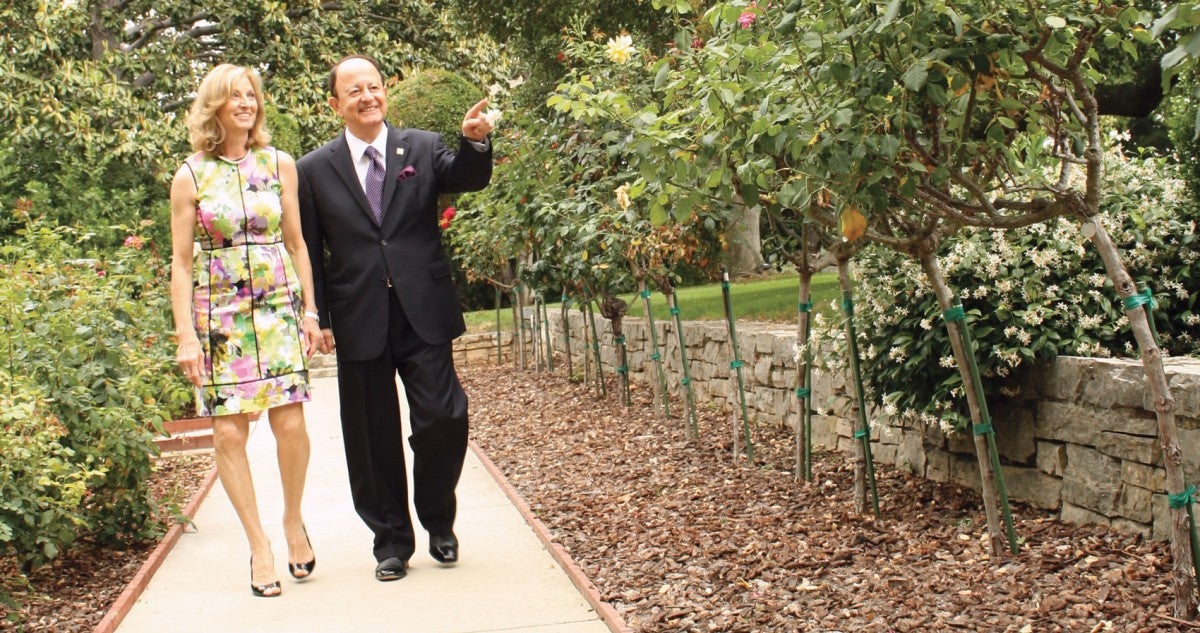
It’s 6:30 p.m. and guests are descending on the house. Here’s a USC physician, fresh from seeing her last patient of the day. Next comes a silver-haired, quick-witted business professor, with his hearty laugh and firm handshake. A steady procession of USC employees, from administrative staff to scientists, follows them to the home’s front door, all ready to see their hosts: USC President C. L. Max Nikias and his wife, Niki.
The growing crowd might intimidate some, but hospitality comes naturally to the Nikiases. They’re at ease hosting groups large and small at the USC President’s House, an expansive yet comfortable estate in San Marino, California, that’s been home to USC presidents for 35 years. Natives of Cyprus, the Nikiases have hospitality threaded through their DNA.
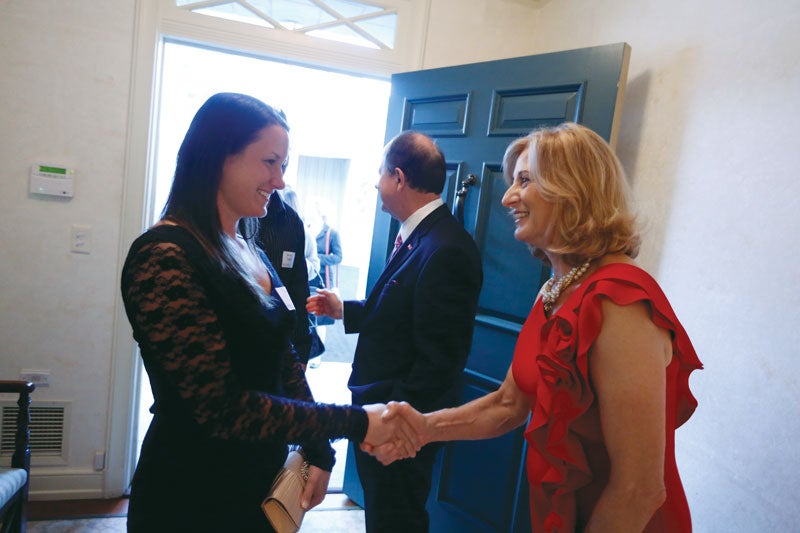
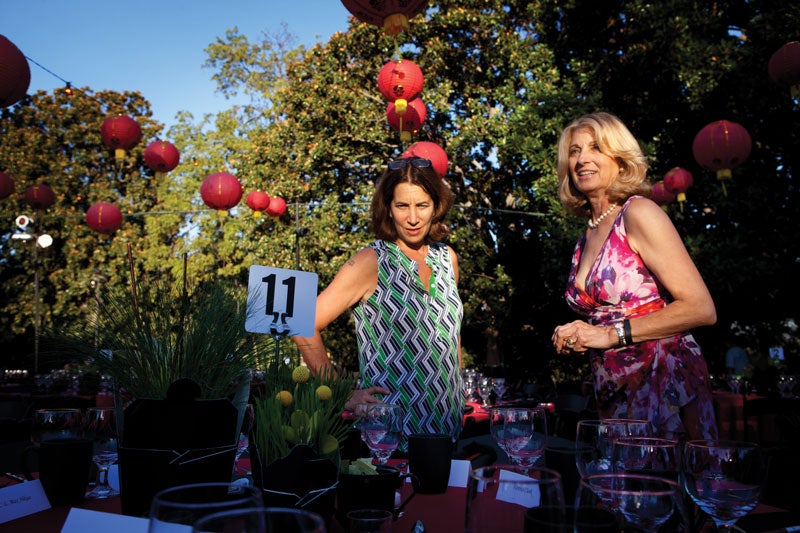
“In Greek culture, you never sit down to have dinner alone,” Niki says. “There’s always the neighbor, the cousin, the mother-in-law, the father-in-law who will drop by and say, ‘Well, what’s up for dinner?’ And you don’t even plan on it. Not only that, but you also plan a lot of parties—birthdays, celebrating by hosting dinners at the house. It’s something that I’ve done a lot.”
“The rule is,” Max adds, “you don’t do it unless you really love it. The pressure is always there, the time commitment is always there. The challenge you face is how you pace yourself. But when you have to be on, you have to be on, and you have to love it. You can’t fake it.”
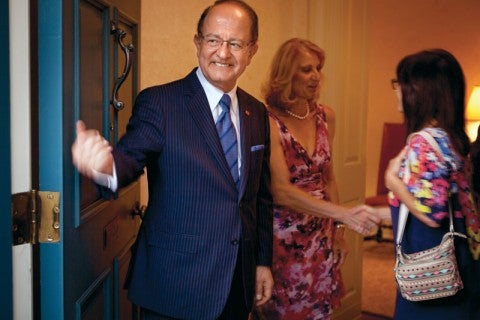
The Nikiases have ample opportunities to put this into practice. Since moving into the home, they’ve hosted about 175 events there—from intimate little dinners of four to orchestrated parties for 400 people on the rear lawn, under a tent. Nearly 15,600 guests have attended gatherings at the house during the Nikias years. “And we shake hands with every one of them as they come through the door,” Max says over his ever-present laugh.
It’s no exaggeration, apparently. “It doesn’t matter the size of the party—when you walk in the door, they’re both right there to greet you,” says Lorna Reed, a member of USC’s Board of Trustees since 1987. “Large or small, they make you feel you’re the most important guest to walk through that door.”
Because of that crush of visitors, the Nikiases are sensitive to the impact the busy entertainment schedule might have on their San Marino neighborhood. For the big events, typically held in December, they not only notify neighbors, they invite them, along with various city officials.
The USC President’s House has long ties to the university. Seeley Mudd, a former dean of USC’s medical school, left his home to the university in his estate, with the stipulation that it house the university president. It has done so since 1979.
After Max Nikias became USC’s president in August 2010, the university undertook some renovations to the house, and the Nikiases moved from their longtime home in Rancho Palos Verdes on the day before Thanksgiving that year.
Demonstrating just how undaunted they are by hosting large gatherings, the couple opened the house to 400 USC students the next day for Thanksgiving dinner. Many of them were international students, while others were U.S. students who weren’t able to get home for the holiday. The Nikiases couldn’t abide the thought of them rattling around near-empty residence halls and a quiet campus.
This couple had personal experience with that. They both earned their undergraduate degrees in Athens before venturing to far-off Buffalo to pursue graduate degrees at the State University of New York.
The holiday dinner, Max says, was Niki’s idea, and “I think she came up with it because we both remember very well, when we came to this country as graduate students, the first two or three years were very lonely on Thanksgiving Day. Everything was closed and you don’t have a family anywhere to go to for Thanksgiving Day.”
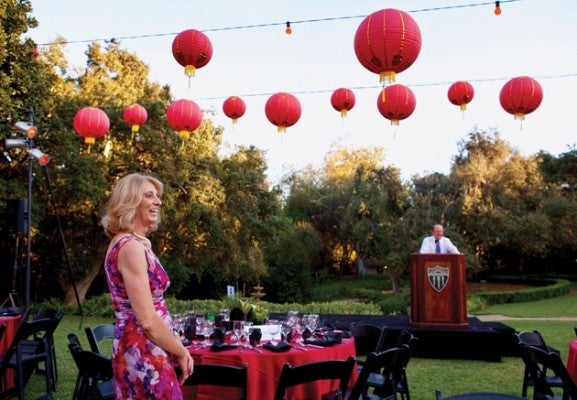
It has since become an annual tradition. “The last couple of years, we noticed that we also get local kids,” he says with a laugh. “From Pasadena, Arcadia. They come for the dinner.”
Niki interjects: “We’d been doing that with our daughters’ friends for years. ‘They have nowhere else to go. Can we bring them?’”
Shiyao Wu, a junior majoring in computer science who grew up in China, remembers experiencing the American holiday for the first time at last year’s Thanksgiving. “I was impressed that it was not just a formal dinner, but really a family dinner,” he recalls.
In addition to being pleasantly surprised by the garden setting, Wu remembers the warmth of the hosts. “President Nikias, his wife and daughters all came, walked around the tables and talked to us and even took pictures with us. That really made us feel that we are a family.”
Reed, the USC trustee, says that it’s a mutually beneficial occasion, because Max and Niki “love the kids, being with them and mingling. It gives them a chance to have some one-on-one conversations with them. Talking to the kids is a highlight of their year.”
They’ve had other students over too. Take that backyard barbecue for basketball players, for one. And during the football team’s NCAA sanctions, when the team was banned from postseason bowl games for two years, the couple twice invited the student-athletes to the home for a Christmas party—with the NCAA’s blessing.
“Being invited to the president’s dinner was an honor,” says senior Katherine Grabar, president of USC’s Panhellenic Council. At a leadership dinner last December, she met the Nikiases and remembers, “The house is stunning. We were free to roam about the grounds and the downstairs of the house. The ambiance was festive!”
The Nikiases also open the home for the annual “1 Percent Dinner” recognizing USC employees who donate 1 percent or more of their pay for USC’s Good Neighbors Campaign, which supports neighborhood partnerships. During the house’s 2010 renovation, guests at the French-themed dinner on campus had such a rousing time that Max declared the next year’s dinner would be “Greek night”—opa!—at the USC President’s House. He stayed true to his word, bringing Greek food, dancers and musicians from St. Sophia Cathedral.
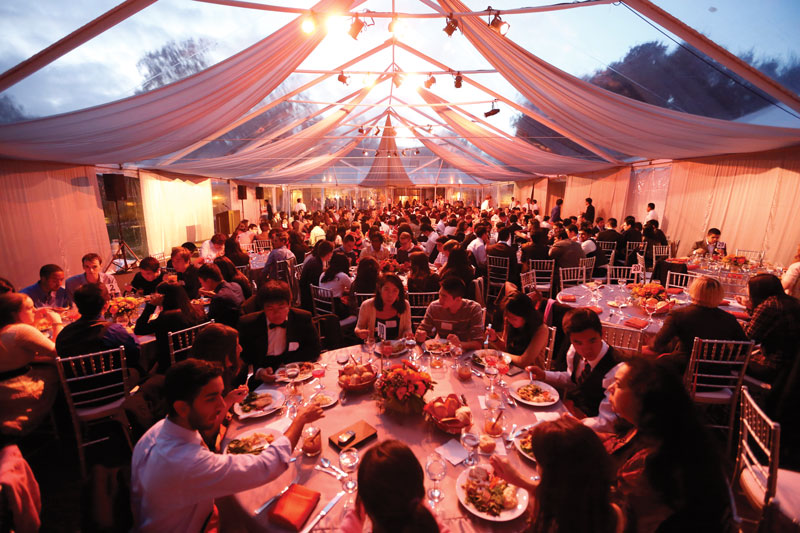
It’s spawned a warm family feeling and memorable entertainment ever since, featuring performers from traditional Chinese lion dancers to artists from the USC Thornton School of Music. At each event, especially the small ones, Max listens carefully to his guests, building connections from the common threads in their lives.
The Nikiases also have hosted donors and supporters who are instrumental to the $6 billion Campaign for USC. Some stay overnight.
As part of the home renovations, Niki asked that a bedroom suite be created on the ground floor. Max says he “half-jokingly, half-seriously” refers to it as the Lincoln Bedroom, because an overnight stay in those quarters costs $1 million, “payable to USC.”
Guests stay up late chatting with their hosts and have breakfast with them in the morning. The couple still chuckle about the overnight visit of David and Dana Dornsife, who donated $200 million to USC’s College of Arts and Letters, which now bears their name. After breakfast the next morning, Max had to leave for his USC office, but told the Dornsifes they were free to linger and stroll the property. He laughs at the memory: “I got a text from Dana: ‘Thank you, Max, we had a great time; 199 nights to go.’”
The press of these social encounters—large and small—is unrelenting. From late August when the school year begins until mid-December, the Nikiases have few nights to themselves in the house. They savor that time together.
The two walk several miles in the neighborhood for exercise or slip out to their favorite seafood restaurant. And they’ve gotten quite comfortable in the house itself. It was built in 1932 by architect Reginald Johnson, who is noted for the Santa Barbara Biltmore Hotel. Paneling was brought from a manor house in England, and rooms in the house had to be designed in accordance with those panels’ specifications, Niki says.
But their enthusiasm really begins to bubble over when they talk about the beautiful murals. What a bizarre coincidence they encountered when they moved into this house.
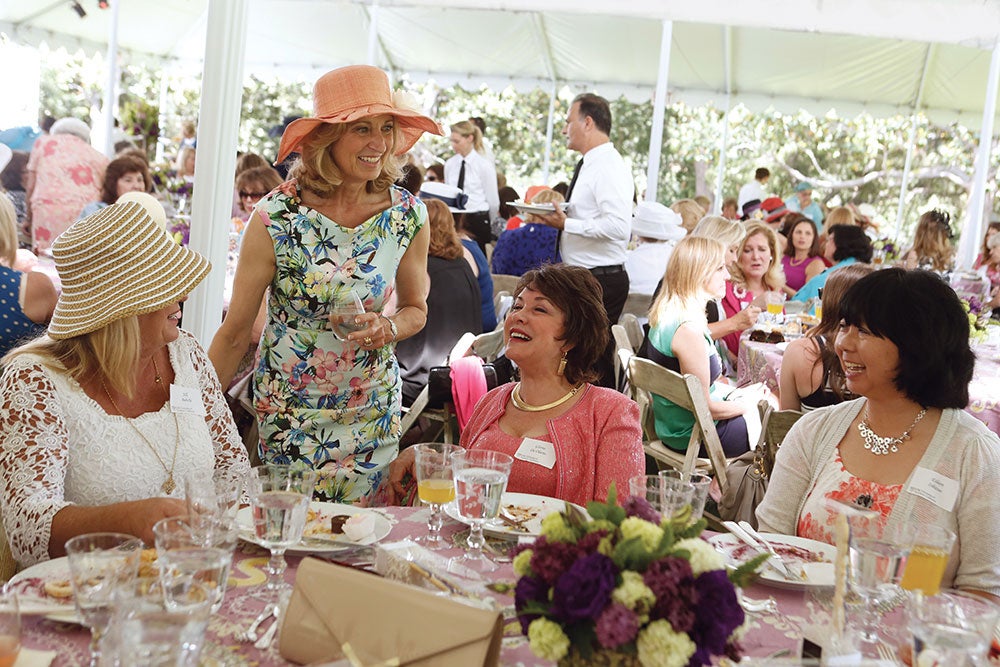
The Mudd family made its fortune mining copper on Cyprus in the early 1900s. One of the sons, Seeley (Harvey, the namesake of the college, was the other), commissioned noted muralist Alson Clark to paint scenes of Cyprus on the walls around the staircase in his San Marino home.
The murals have long since been painted over, but Max has old, yellowed photographs of them. He excitedly riffled through a folder of them. Look at this, he says—the Greek theater of Salamis: “Niki grew up two miles from it!”
Then he produces a photo of a mural of the Byzantine monastery Antifonitis, which was painted at the base of the stairs.
And the tour continues. They both gesture out a window toward a stand of trees in the backyard, where the roof of a small building peeks through the shrubbery—it’s a playhouse, built for Mudd’s daughter, and it has electricity, running water and a kitchen.
There seems to be no evidence that the Nikiases’ hospitality is forced. Or rushed. This really does come naturally to them.
“The interesting thing,” says Lorna Reed, “is that though it is the Nikiases’ home, they truly believe it is all of the university’s house. That’s why they love to entertain so much. ‘Come to your house.’ It’s a wonderful feeling you get as having a little bit of ownership.”
